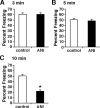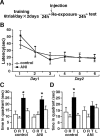Memory reconsolidation and extinction have distinct temporal and biochemical signatures
- PMID: 15152039
- PMCID: PMC6729467
- DOI: 10.1523/JNEUROSCI.5491-03.2004
Memory reconsolidation and extinction have distinct temporal and biochemical signatures
Abstract
Memory retrieval is not a passive phenomenon. Instead, it triggers a number of processes that either reinforce or alter stored information. Retrieval is thought to activate a second memory consolidation cascade (reconsolidation) that requires protein synthesis. Here, we show that the temporal dynamics of memory reconsolidation are dependent on the strength and age of the memory, such that younger and weaker memories are more easily reconsolidated than older and stronger memories. We also report that reconsolidation and extinction, two opposing processes triggered by memory retrieval, have distinct biochemical signatures: pharmacological antagonism of either cannabinoid receptor 1 or L-type voltage-gated calcium channels blocks extinction but not reconsolidation. These studies demonstrate the dynamic nature of memory processing after retrieval and represent a first step toward a molecular dissection of underlying mechanisms.
Figures







References
-
- Abel T, Nguye PV, Barad M, Deuel TA, Kandel ER, Bourtchouladze R (1997) Genetic demonstration of a role for PKA in the late phase of LTP and in hippocampus-based long-term memory. Cell 88: 615–626. - PubMed
-
- Anagnostaras SG, Gale GD, Fanselow MS (2001) hippocampus and contextual fear conditioning: recent controversies and advances. Hippocampus 11: 8–17. - PubMed
-
- Anokhin KV, Tiunova AA, Rose SPR (2002) Reminder effects–reconsolidation or retrieval deficit? Pharmachological dissection with protein synthesis inhibitors following reminder for a passive-avoidance task in young chicks. Eur J Neurosci 15: 1759–1765. - PubMed
Publication types
MeSH terms
Substances
LinkOut - more resources
Full Text Sources
Other Literature Sources
Medical
